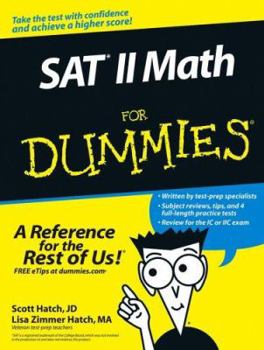SAT II Math for Dummies
Select Format
Select Condition 
Book Overview
Tips on preparing for test traps The pain-free way to maximize your score Don't panic You've got 60 minutes to answer 50 questions covering numbers, operations, algebra, functions, geometry, trigonometry, statistics, and probability. How do you conquer exam jitters and score your best? This friendly guide delivers just what you need -- a thorough review of math topics covered on the IC and IIC exams, plus two complete practice tests for each exam and lots of insider tips to help boost your score. Discover how to * Recognize wrong answers * Zero in on the best answer * Manage your time * Minimize test-taking anxiety * Familiarize yourself with the format
Format:Paperback
Language:English
ISBN:0764578448
ISBN13:9780764578441
Release Date:April 2005
Publisher:For Dummies
Length:413 Pages
Weight:0.65 lbs.
Dimensions:1.1" x 8.3" x 10.9"
Customer Reviews
1 rating
SAT II Math For Dummies--a review
Published by Thriftbooks.com User , 19 years ago
When Mattel brought out the talking Barbie a few years ago, cries of educators and feminists forced the toy company to take the chatty doll of the market. Nonetheless, the teaching of mathematics has caused chills in the hearts of high school students, many of whom realize this is a subject where close enough and fudging does not count. In the 1990s, the slogan "do the math", to visualize a bargain made or lost, merely referred to elementary arithmetic. And McDonald's and other fast food purveyors have cash registers that only cite the name of the sandwich, and not the pricing thereof. The nasty numbers are forgotten. Lawyers, who, except in criminal law cases, usually deal with measurement of damages, division of property or other numerical concepts, are notorious for having avoided mathematics classes throughout their undergraduate training (law is one of the few graduate fields that has no prerequisites whatsoever). And so our country lumbers along with distressing mathematical illiteracy. It was largely to meet this unfulfilled need that the SAT II came into being. And, although the testing has changed, the phobias associated with math tests still remain. Ironically, math proficiency may be the only aptitude test that is relatively free of cultural bias. You do not have to be proficient in the English language to excel in mathematics. This book, like most of the "Dummies" series, is "for the rest of us"...including those who have somehow become good estimators, because they have avoided calculation throughout their professional lives. It is interesting, in this respect, to note that neither of the authors of this book is a mathematician. Scott Hatch is a teacher of law, Lisa Hatch a teacher of English. Both bring their sense of logic and a common sense approach to this most daunting of subjects. And they do it well. The aim of this book is twofold: to provide a review of high school algebra, geometry and trigonometry, on the one hand, and to teach the aspiring collegian the best strategy for success on the SAT II. In this regard, the Hatches follow the same teaching philosophy used in the other Dummies series. A substantive review of the subject (algebraic functions, for example) is immediately followed by the type of questions the test-taker might expect. In this regard, the Hatches use a handicapping system worthy of any good horseplayer or a guide to Vegas. By the time one finishes this book he or she should be an expert in casting out the egregious or hysterical answers, at the same time narrowing the field among possible answers. Of course in mathematics, more than in the other test subjects, a solid knowledge of the area is essential to winnowing out the wrong answers and zeroing on the correct--or at least the best--response. In addition to mathematics per se, the review guide goes into the field of probability, which, of course is the stuff statistics are made of. "Mathematicians didn't like living in an imperf





